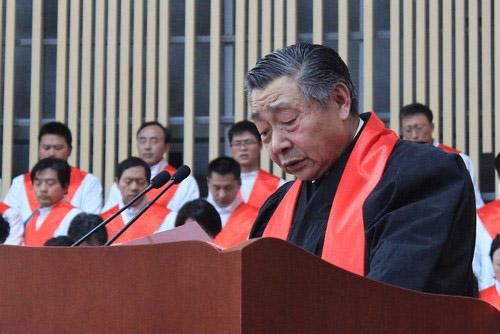Born in 1928, into a family with three-generations of pastors, Rev. Zhao Zhien has served in the church for more than seventy years and also devoted himself to theological education. He has experienced the Cultural Revolution, the reopening of the church in the 1980s, and devoted himself to theological education.
When Rev. Zhao was four years old, his father, a Methodist pastor, promised to offer him to God as a pastor if he was healed from asthma and cough.
He was named "Zhien" (meaning "remembering grace"). Zhao studied in missionary schools from elementary to middle school. After graduation, he was admitted into Soochow University for a major in medicine, but he changed his mind during a revival meeting. He decided to study theology at Nanjing Union Theological Seminary, a public institution.
However, his dedication took a huge blow in the 1950s and 1960s. "In 1966, the whole church (in China) was crushed on a full scale. A Bible with a leather cover and golden edge, given to me by my father when I was ordained as a pastor, was confiscated." But he was still determined to serve the Lord.
Church Development in the Past 40 Years and Future Challenges
When he was about 50, the Chinese church was reopened. He said, "People had thirsty hearts and needed Jesus. Churches were reopened. Singing hymns and hearing sermons, many elderly believers burst into tears in services."
The number of Christians grew at a frenetic pace. Rev. Zhao said as that generation passed away, cults and heresies began to multiply. During the church development, there was a loss of a generation of pastors. It was particularly urgent to train regular pastors in a situation where there were far more believers than pastors.
He recalled that when the church in China was reopened, the first Bible was found in a book stack of a Beijing church and later copied to produce more Bibles. A batch of Bible copies were printed by a printing company belonging to the PLA (army), and distributed by the church in Jiangsu to its congregations. The Amity Printing Factory had not been established then.
The pastor claimed that the current challenge for the church was to build a better church. For example, many believers had such a low faith quality that their convictions were superstitious and pastors needed to guide them unto the right path.
Another example was that Christians should respect non-Christians and preach the gospel in a flexible way because Christianity was on the verge of society and could show love through service like what missionaries did.
Have Right Concept of the Church and Avoid Attacks Between Denominations
Meanwhile, he stated that Christians should have a correct ecclesiology. On one hand, the church should neither have political purposes nor contend for power and profit; on the other hand, there should be rules and standards for the clergy. Though the Chinese church lives in a post-denominational period, there are denominations that should respect and avoid attacking each other. Ecclesiastical polity and governance were necessary for church growth since the church needed pastoring and congregational teachings.
Pastors should be aware that most testimonies given by believers were about being healed of diseases, especially in grassroots churches. Jesus was regarded as a doctor. Though the church did not deny carrying out healing and driving out, those should not be the whole story. Consequently, pastors should be devoted to enhancing the quality of congregations.
At the same time, the church should work to integrate into society as a part of it and be the light and salt of society. Every church should have charity, for instance, a nursing home to show concern to lonely elderly people, and donations for vulnerable groups.
Reflect on Theological Education and Sinicization of Christianity
In 1952, when Rev. Zhao began to work in Nanjing Union Theological Seminary, there were 102 students. Later on, the number never exceeded 100. Many young people were reluctant to study theology because it had no future in their eyes.
He was one of the staff of the Christian book fair in Germany. Many people were surprised at the books published by the Christian community in China after the Cultural Revolution. He noticed that the older generation of church leaders had accumulated knowledge of the era predating the establishment of the PRC. Bishop K.H. Ting studied in the Union Theological Seminary of New York and was hardworking with a good command of Chinese and English. Professor Chen Zemin learned English in the University of Shanghai (Baptist) and was able to read English books. He added, "They were typical intellectuals with solid theological knowledge."
With regards to theological education, the pastor said that it should comply with church traditions that have lasted over 2,000 years, meet the present demand of the church, and adapt to society. "Theological education should understand the Bible, faith and theology. It is not hollow, but needs to be applied to society and life. It should be sown to the earth. Pastors give sermons not to show off their learning or spread them encyclopedically, but to melt them in life." He encouraged today's pastors to improve their spiritual, theological, cultural and moral accomplishments.
Concerning the sinicization of Christianity, he pointed out that Christianity in China should fit in with China's conditions and culture, and observe the laws and policies issued by the Chinese government. In history, church predecessors already put forward independence and indigenization, like the China Christian Independent Church, therefore the sinicization of Christianity was not a new topic.
Aged over 90 today, Rev. Zhao is often invited to deliver sermons in local churches. Calling his path of servanthood "a pilgrimage of grace", he said, "Step by step, God led me to walk on the ministry path from my juvenile years to my middle and old ages, to my twilight years; I truly want to sing 'The Lord's grace is more'."
- Translated by Karen Luo












